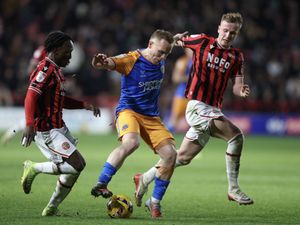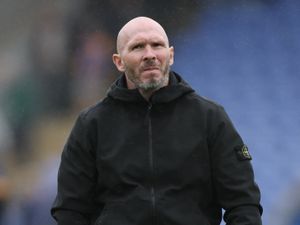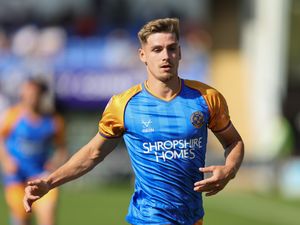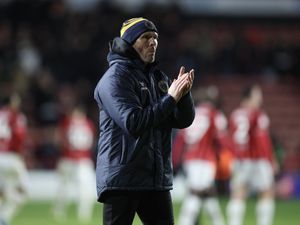Arthur Rowley: A promotion push, cup joy and so nearly a dream end
Arthur Rowley is a Shrewsbury Town, Leicester City and English Football League legend.
His stunning achievements in front of goal – Town’s all-time record league goalscorer (163), second highest scorer in Foxes’ history (265) and all-time leading Football League goalscorer (434) – mean that ‘Gunner’, as he was known, is unrivalled in league football history in this country.
He is the younger brother of Jack, whose 211 goals for Manchester United stand him fourth on the Old Trafford list of goalscorers, bettered only by Rooney, Charlton and Law.
Author Ian Davidson has written a book charting The Forgotten Brothers – the untold story of English football’s greatest ever goalscoring brothers.
The author sadly passed away just one month after completing the book on the Wolverhampton-born greats, but families of those involved wished for the works to be published. A release date is yet to be confirmed.
And, with kind permission from Ian Davidson/Blue Army Publishing, the Shropshire Star can preview extracts from Arthur’s prolific time in front of goal as player-manager, and then boss at Gay Meadow.
For more information on the book, contact bluearmypublishing@outlook.com
1959/60 Division Three promotion push
Arthur was, of course, too modest to assess his own playing capabilities but he probably knew that, despite now being aged 33, if he could stay healthy and fit that he could continue to score enough goals to help his team considerably.
Shrewsbury started the season well, staying undefeated in their opening four fixtures, including a pleasing 3-0 win at rivals Port Vale and a thumping 5-0 victory over Accrington Stanley on August bank holiday Monday with – you guessed it – another hat-trick from Arthur Rowley.
The excellent start saw Town firmly established in the top six – a position they would remain in for almost all of the rest of the season.
By the end of the season, Shrewsbury had finished in third position, one place off a promotion spot – a wonderful effort for Arthur’s team, although they were nine and seven points behind champions Southampton and second-placed Norwich City respectively.
They finished with 97 goals (second only to Southampton) although a tally of 16 draws tells its own story.
Arthur’s personal contribution of 32 goals in 41 fixtures (he only missed five games all season) was highly satisfying. However, he was now aged 34 and would admit to colleagues in the summer that whatever speed he had – and he was never the quickest – was slowly diminishing, while his waistline was slowly increasing.
He knew that he’d have to rely even more upon his instinct to outwit defenders but more often that not that was enough in the lower divisions of English football.
His haul of goals in his second season at Gay Meadow meant that Arthur was now closing in on a personal milestone.
At 352 league goals, he was now just 28 goals shy of beating the record at that time which stood at 379, held since 1939 by one of Arthur’s heroes William Ralph Dean, better known to all football fans as Dixie Dean, whose goals had come over a 16-year period between 1923-1939 for Tranmere Rovers, Everton and Notts County.
When questioned about the personal milestone, Arthur remained dismissive by always responding with: “Do my goals help my team? Because that’s all I’m interested in.”
However, Shrewsbury Town fans and football historians alike, were getting excited at the prospect of Football League history being made, as the team prepared for another bash at promotion in the coming season.
1960/61 League Cup semi-final
The team enjoyed a long run in the embryonic League Cup – the new competition that had been established by Football League secretary Alan Hardaker, as a way of making up potential lost revenue due to a proposed restructuring of the league.
Although the proposal never materialised, the new cup went ahead anyway as clubs needed to capitalise on the possibility of night fixtures following the installation of floodlights at nearly every ground throughout the previous decade.
The new League Cup saw Shrewsbury beat Swindon Town 2-0 after two replays in October, Bradford City 2-1 in November and then Norwich City 1-0 in December.
This took Town into a high-profile quarter-final tie at home to mighty Everton from the First Division on Wednesday 15th February 1961.
In front of a packed Gay Meadow, Shrewsbury Town memorably won 2-1 despite an Everton side containing quality players such as Scottish international right-back Alex Parker, Welsh international Roy Vernon and England international and Everton legend Brian Labone, who to this day holds second place in the club’s list of record appearances (second only to Neville Southall).
Sadly ,Shrewsbury missed out on the final by narrowly losing a two-legged semi-final to Rotherham United.
The first leg was lost 3-2 at Rotherham in front of 13,337, before another capacity crowd of 17,722 squeezed into Gay Meadow, only to see Town draw 1-1, and thus exiting the competition by the odd goal.
It was a magnificent effort by Arthur Rowley and his team in the inaugural League Cup, which would be won by Aston Villa in a two-legged affair over Rotherham.
1964/65 – hanging up the boots
Arthur began the new season as a 38-year-old, with it turning out to be his 20th and final season as a Football League player.
He selected himself on just 12 occasions, which yielded just two goals, bringing his final goal tally to 434 goals in 619 league appearances.
Towards the end of the season, Arthur announced his retirement as a player but he would of course, remain with the club as manager.
His playing record at Shrewsbury Town was very impressive – 152 league goals in 236 appearances – and all coming after Arthur had joined the club as a 32-year-old.
A truly wonderful and selfless record for a 30-something, who, as he got older, would often play in pain.
1967/68 Almost a dream finale
Arthur’s final season in charge turned out to be very successful indeed, with his side almost achieving promotion into Division Two for the second time during his tenure.
Despite winning just two of their opening 11 league games, which left them in 20th position, the team achieved a level of consistency thereafter to make a genuine push for the title, not just promotion.
The season included a high-profile FA Cup third-round tie versus the mighty Arsenal, with Arthur’s team holding the Gunners 1-1 at Gay Meadow, with another bumper attendance of 18,280 watching.
Dolby scored for Shrewsbury while Radford responded for Arsenal, who prevailed 2-0 in the replay at Highbury three days later, with goals by Sammels and Jenkins in front of almost 42,000 fans.
And so, after a decade at Gay Meadow, Arthur left the club with the blessing and gratitude of everybody involved.
Even to this day, Arthur is rightly regarded as a Shrewsbury Town legend and in the year 2000 he would be voted their best ever player.
He was sad that he couldn’t quite deliver Second Division football to the club that he grew to love, but a measurement of any manager is often where they leave the club, compared to where the club was when they first arrived.
And in that respect Arthur could hold his head up high, as he had served the club well, with so many great victories and personal landmarks achieved along the way.
Arthur would never lose his love for the club, retaining the family home in the Copthorne district of Shrewsbury, which allowed him to visit Gay Meadow on a regular basis following his retirement from football in the late 1970s.
It’s also true to say that the Shrewsbury fans and the club never lost their love for Arthur either. There is no better tribute than to have something named after you, in recognition of your contribution to a club.
And so in 2007, following the club’s move to their new stadium, a corporate suite and lounge bar was named after Arthur in order that his name will forever be remembered. A fitting tribute indeed to the ‘Gunner’.





